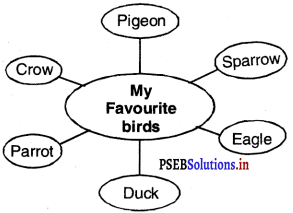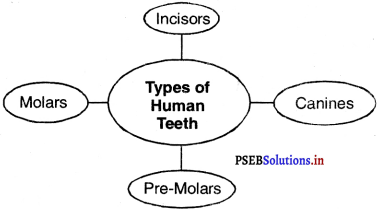Punjab State Board PSEB 4th Class EVS Book Solutions Chapter 12 Beaks and Teeth Textbook Exercise Questions and Answers.
PSEB Solutions for Class 4 EVS Chapter 12 Beaks and Teeth
EVS Guide for Class 4 PSEB Beaks and Teeth Textbook Questions and Answers
Textbook Page No. 82
Activity-1.
Speak some tongue-twister sentences rapidly. Few are given below :
1. Kutcha papad pucca papad-Kutcha papad pucca papad.
2. Dilli de dukandar, dadi de do dukhde danda di dawai de de.
Answer:
Do it yourself.
![]()
Question 1.
Write the number of milk teeth and permanent teeth.
Answer:
Milk teeth-20 Permanent teeth-32
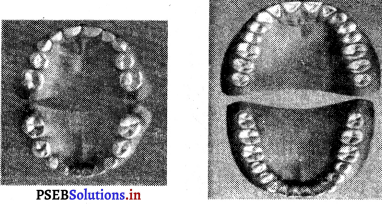
Question 2.
What are the functions of tongue?
Answer:
1. Helps in knowing the taste.
2. Helps in speech.
Activity-2.
Write down the number and health of teeth of your family.
| Name of Member | Relation | Number of Teeth | Health of Teeth |
Answer:
Do it yourself.
![]()
Question 3.
What is Enamel?
Answer:
Hardest outer white layer of teeth is called Enamel.
Textbook Page No. 83
Question 4.
What do you do to prevent tooth decay?
Answer:
We should clean our teeth before sleeping and after getting up early in the morning.
Question 5.
Match the Columns :
(A) (B)
1. Incisors (a) Tearing of food
2. Canines (b) Chewing of food
3. Pre-Molars (c) Grinding of food
4. Molars (d) Cutting of food
Answer:
1. (d),
2. (a),
3. (b),
4. (c).
Question 6.
Which tastes are felt with tongue?
Answer:
Sweet, sour, salty, bitter.
![]()
Textbook Page No. 84
Question 7.
What do you mean by “Haathi de dand, khan de hor, vikhaun de hor”?
Answer:
Elephants have a pair of teeth outside the mouth which are not used for eating purpose. Therefore it is said that ‘Haathi de dand, khan de hor, vikhaun de hor.
Question 8.
What is the function of long teeth (incisors) of dog?
Answer:
Dog is a carnivorous animal. They tear the flesh with the help of these long teeth.
Activity-3 :
Observe the food habits of animals living around you.
| Name of animal | Food | Herbivorous/
Carnivorous |
shape of incisors |
Answer:
Do it yourself.
![]()
Textbook Page No. 85
Write names of the birds below the Pictures.
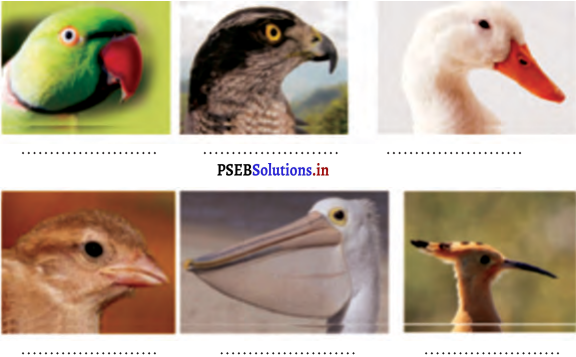
Answer:
1. Parrot
2. Eagle
3. duck
4. Sparrow
5. Pelican
6. Woodpecker.
Textbook Page No. 86
Question 9.
Tick (✓) the correct answer:
(a) Which of these birds eat fish?
Parrot
Kingfisher
Crow
Pigeon
Answer:
Pigeon
(b) Which of these birds have a pouch under its beak ?
Duck
Pelican
Woodpecker
Kingfisher
Answer:
Pelican.
![]()
Question 10.
Why is the beak of woodpecker larger than beak of Sparrow?
Answer:
Woodpecker picks insects from the holes of the trees so it has long beak but sparrow picks grains so its beak is small.
Question 11.
Which of the birds eat flesh after preying?
Answer:
owl, eagle, kite.
Activity-4 :
Write the names of the birds with long and short beaks and their food.
| Long beaked birds | Food | Short beaked birds | Food |
Answer:
Do it yourself.
![]()
Textbook Page No. 87
Activity-
Claws of different birds are given, write their functions.
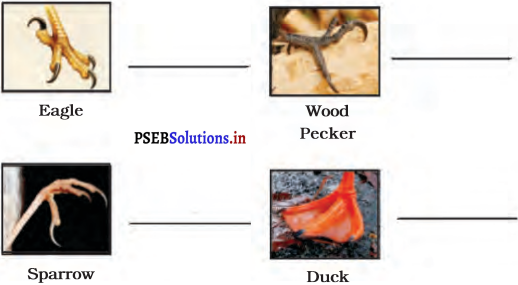
Answer:
Catching prey and tearing flesh
Can catch the bark of the tree
tightly hold the tree
To swim and to walk over water
Textbook Page No. 88-89
Question 12.
How does the eagle use its claws?
Answer:
It uses its claw to catch its prey.
Question 13.
How do the Claws of a duck useful for it?
Answer:
It helps in swimming over the water.
![]()
Question 14.
Which bird can easily climb the trees?
Answer:
Woodpecker.
Activity-5 :
Write the function of nails by seeing the birds around :
| Name of the bird | Function of nails |
Answer:
Do it yourself.
Activity-6.
Put the grains for the birds at same place daily in your house and write down the name and number of birds who came there to eat grains :
| Name of the bird | Number | Name of bird | Number |
Answer:
Do it yourself.
![]()
Question 15.
Mind Mapping :
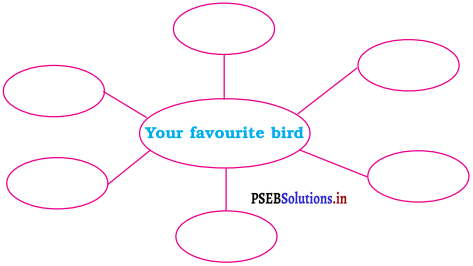
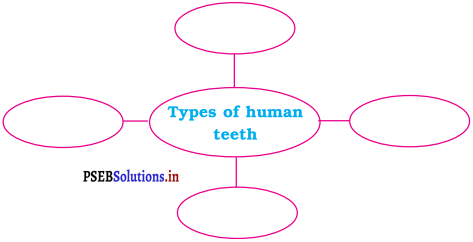
Answer:
